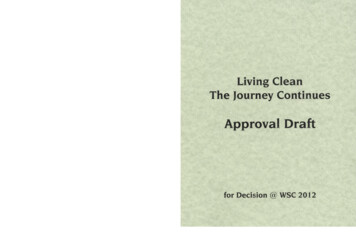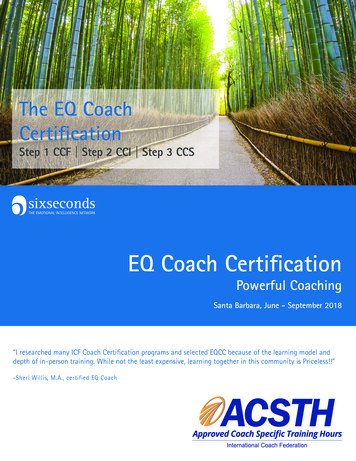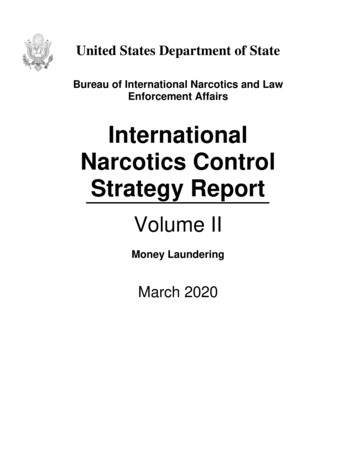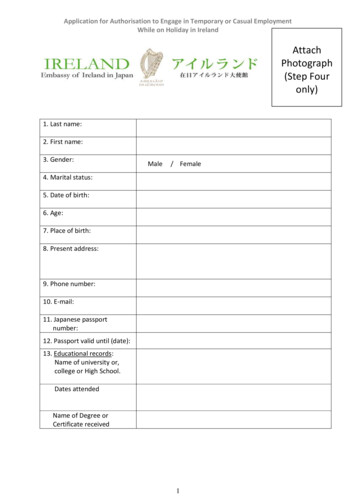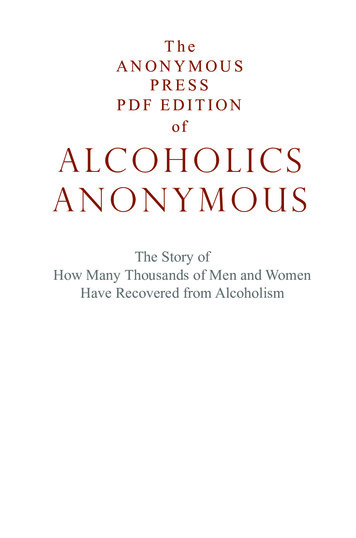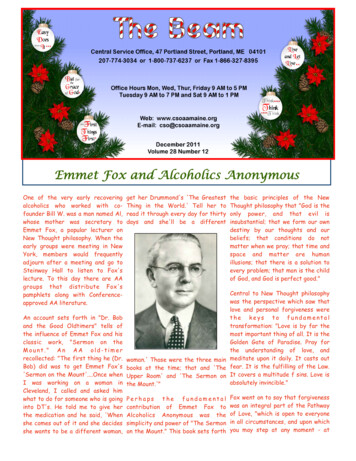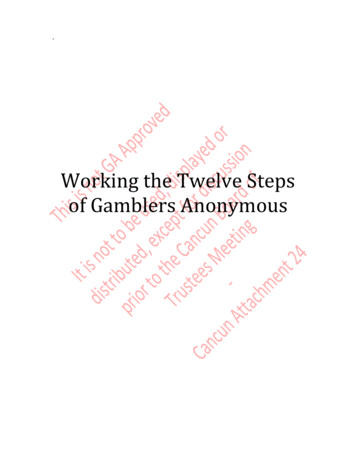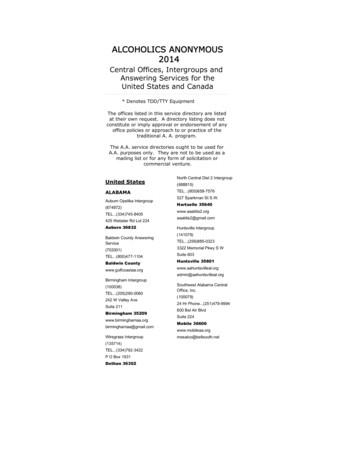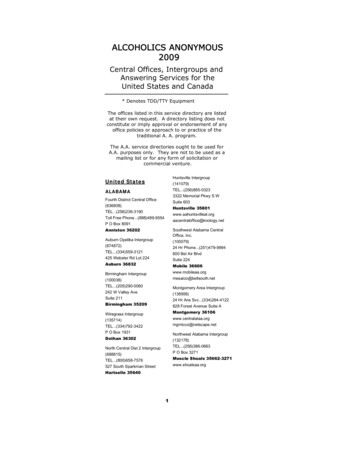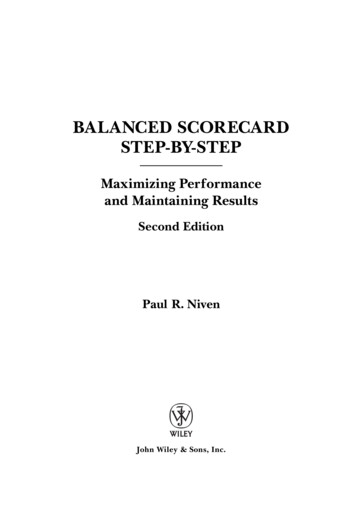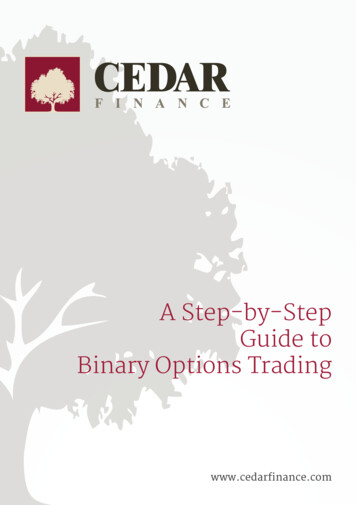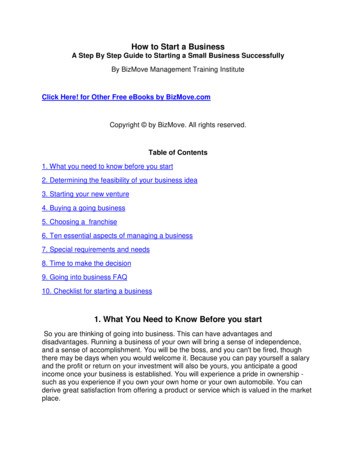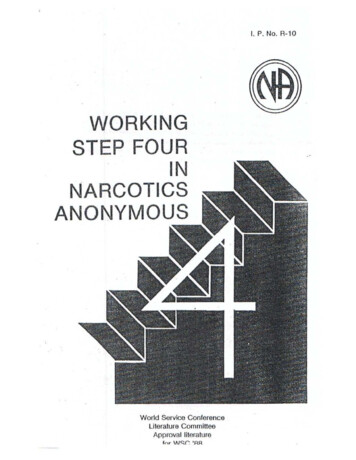
Transcription
I. P. No. A-10WORKINGSTEP FOURINNARCOTICSANONYMOUSWorld Service ConferenceLiterature CommitteeApproval literaturefr.,.wc:.r.'AA
lltis is a mcxlel of whac a thorough Fourtl1 Step inventorymight be. While we strive cowards thoroughness, we may find,especiall y in our first aucmpc, chal we are nm able co answerall of these questio ns. In fact, many of us may feel overwhelmed, buc w e do not lee Lhis deter us from being as'thorough as we can possibly be. Copyright 1987 by World Service Office, Inc.P;Q. Dox 9999Van Nuys, Califontia U.S.A 91409All rights reserved
\VORKING STEP FOUR INNARCOTICS ANONThlOUS"lVe nwde a searching and fearless moralinventory of ourselves." ·'fhis guide is intended to be used as an aid ro writing afourth Step inventory. It is extremely ilnponant that \Vework with an N.A. sj1onsor. If you don't have one yet, this is agood time to find one who can help guide you through thesesteps. After reading through this guide · on your ow n, wesuggest you read it again with your sponsor before beginningt11e Fourth Step. It is also very helpful to use other N.Aliteranue and step meetings to gain more infonnation abouttJ1e Fourth Step. 'fhere are many n1 thods of writinginventories, and no one way is right for everyone. This guiderepresents the experiences, strengths, nd hopes of manyaddicts who have found recovery in Narcotics Anonyrnous.Regardless 9f the method, OU Fourth Step will be successfulif we are searching and fearless.Searchirz.g and Fearless. .Step Four calls on us to be searching and fearless. We areasked to look carefully at ourselves and to get beneath theseJf-deceptions we have used up to now to hide the . tnithfrom ourselves. We search within, as if entering a dark housewith a si n g le c ndl e to guide u s \Ve move :lhe:ld, despite on rfear or resistance to tJ1e unknown. \Ve need to be willing toillun1jnate eve1y comer of every roon1 of our nlinds as if ourlives depend on it, b ecause they do.1
What \\'e arc searching for here is a complete andtotal picture of ourselves. We have found that this requires honesty-honesty to ex unine our behaviors, feelings,thoughL.:;, and n1otives, regardless of how u1tin1portant theyn1ay appear. Our self-honesty is n1os t iinportant since it "villlead us to discover how our disease has affected our lives. Wehave operated w ith a distorted self-in1agc, never fully lookingat the \\ hole pic ture all at once. Now, possibly for the firsttime in our lives, we will begin to sec ourselves as we reallyare, rather than as we in1agined or fcmtasized. 111e n1oreaccurate and con1plete this picture is, the 1nore freedom we.f'vill gain.'.At this point we need to en1phasizc that being thorough isnot the same as being perfect. 111:.:re aren't any perfectfourth Steps. We do the best we -ctm to be as thorough asp ossible. With diligence and perseverance , we .write ashonestly as we can. Expecting p e rfection fron1 ourselves canson1etiJnes be a ·\.vay of putting off writing our f ounh Step.We may also have heard people say "If you don't do athorough inventory, you'll use again." But here we have togo back to our Third Ste p and trust God wid1out anyreservations. If we focus on our fear that our invento1y won'tb e good enough, or worry about what our sponsor will say\vhen we share it, we 1nay never get going. lnis won't be thelast inventory ·we '\vrite. It's not neccss'uy to write a bestselling novel; it's only necessaiy to rnake an honest beginningand be as thorough as we can be. One of the things w elearned in the Third Step was to tn1s t God. Now we can befearless and write the truth. This Fourth Ste p is a .freeingprocess as· well as a healing one. We put our faitl1 in a lovingGod ·and trust that whatever we write w ill be exactly what.vve' re supposed to write if we are truly searching andfearless.12
. .Afora l bzvento1y . . .In Step Four we are asked to take a n zoral invento1y.\Vh e n we first heard the ·word moral, some of us h adrnisconceplions of w hat that n1eant, w hile o thers h ad nounde rswoding at all. Morals are sin1ply values, the principlesthat we choose to live by today in our .r ecovery. It is not thepurpose of this gu ide to de fine 1norality no r to define a set ofmo rals that others sho uld live by. \Ve recognize that each ofus p ossesses o ur ow n internal values. We may choose tode fine good as that w h ich has the po rer to bring out thebest in us and affirm our rec overy and bad as that w hich hasthe p ower to bring o ut rhe worst in us and works against ourrecovery. ·L00king at our fe elings c an be very he lpful he re too. Inw riting our fourth Ste p, we w ill need to take a look, no t onlyat w hat we did, but also at how w e felt. Our mo rals may h iivebeen vague or unde fined , but even in ou r active addictio n wehad the m. In sin1atio ns w here we fe lt b ad, o r felt thatsomething was w rong, it was n1ost likely because wecon1promised our mo rals or Y\rere unable to uphold ·then1.·w hen we can1e to chat understanding, we saw how thesteps fit together. We began to see tbe exact nature of ourw rongs. 'fllat meant n1ore than just tlle w roi1g things we did.It rneant looking b eneath the w rong thing we did, to thena ture of that w rong. for ex an1ple, if we stole 1noney frornour parents to buy drugs, that was a w rong. \Xlh at was·rhenature of that w ro ng? The nature of that w rong wa.S o ur selfcenter edness, our fear, our dish onesty and unkindness. \Vewere self-c ente red in that we w ant:ed w hat we wanted atano ther persori's expense. \Ve were fearful that we i.vouldn'cget w hat we wan ted. We were dishon est in that we rook1noney ·w ithout the othe r person's knowledge or pennission.We were unkind in tha t we did som e rhin g rh r h urt nothechun1an bei ng.3
. . .0f 0 urselves .It is i111porta11t to 1re1nen1ber that this is our inve ntory. Itis not a place to list the faults or 'vrongdoings of others.When we look at our lives in this way, we sec that the natureof our wrongs, our character defects, are the characteristicsin our lives that ai e in opposition to spiritual principles. Ourinventory, then, is a process of discovering how ourcharacter defects bring not only us, but also others, pain anddiscomfort ,.and how our new life, founded on the TwelveSteps, one that can brir g us serenity, contfort,joy. Outof the Fourth Step we discover those tltlngs d1at get iri ourway and those things that work for us.isandGENERAL GUIDELINESWhen ' 'e are ready to begin, we ask God to help us to besearching and fearless in this inventory. Some of us evenwrite a prayer. at the beginning of our jnvcntory. 111eimport 1t point is that we sit down and start writing. Asfeelings surface we rnust be willing to face the1n and keepwriting. So1ne of then1 n1ay be tinconlfortable or disturbing,but no 1natter what happens, we know that God is with us.We can feel good about the fact that we are taking positiveaction for our recovery. We then ask a loving God to help us,and try to rerne1nbcr tl1at what we write is betweenourselves and the God of our own understanding.The following outline provides a structure for cxanuni ngourselves. It contains the basic ele111ents that we usein o r inventory. To ke p fr m getting bogged 9ow , stay intouch with your sponsor. So1nc helpful suggestions are:1l. rollo-w- the outJjne an l t e one .section at atime;2. Leave a wide tnargin so you have roo1n to n1ake notes ofany t.houghts that pop into your head as you write;4
3. Don't erase or cross out anything and don't edit yourinventory.Throughout this guide, there ar examples of the kinds ofquestions w e ask ou se lves. Son1e of th se questions may notseem to apply to you. They are included to assist you in yourinventory. Write each question on your pape r as you go.\ 'henever the answer is a simple "yes," list examples. Jn eachsituation, try to see where you were wrong, what yourn1otives \vcre, and what your part was.Jn looking 3t our behavior before, during and after activeaddiction, patterns begin to en1erge. The purpose of asearching and fearless moral inventory is to get at the truth,to take a hard look at realify. \That we are attempting to dohere in the Fourth Step is not only to see where we werewrong, but to understand what our part was, and how wemight be perpetuating those patterns. It is this discoveryand identification that allows us to be freed of our defectsin the subsequent steps. Although il may sometimes beembarrassing or even painful to be honest with ourselvesabout our wrongs ·and character defects, sin1ply writing thisinfonnation dO'wn cannot hurt us.·First Three Steps Review By now you have taken the firstthree steps 'With. your sponsor. These provide the necessarypreparation and foundation for making a searching andfearless moral inventory of ourselves. Many of us have foundthe process of writing out the first three teps to be vaJuable.Now, before wtitiog your inventory, go back and review your ·first three steps. At this point we are re n1inded that it is onlythrough a Higher Power, not our own power, that we canprdc ced fearlessly. Before we begin writing, we take a few ·moments of silence to a.c;k the God o f o ur undei-standing for·the courage to be fearless and thorough. NO\V \VE ARE flEADY.TO BEGIN WRITING OU R f OURTH STEP.5
I. Rese11l111e11ts Our resentments caused us liscornfort. Werelived unpleasant past experiences again and again in ourminds. We were angry about things lhat happened andkept a me ntal grudge list. We regretted the clever dungswe had not said and planned retaliation l.hat may or n1aynor have taken place. We were obsessed v-rirh the past andthe ftH11re, and therefore cheated ourselves of the present.\Y/e need to write about these rescnunents now co see thepart we played in forn1ing thcrn.-'.A List t/Je people, 01ganizations, and concepts youresent. Most of us st.art with our c hildhood, but anyorder 'vill work as long as it is con1plete. lnclud allthe people (parents, mates, friends, cnenties, ourselves,etc.); the organizations and institutions (jails, police,hospitals, schools, etc.); and the concepts (religions,politics, prejudice, social custo1ns, God, etc.) at whomyou are angry.B. List tbe cause or causes ofeach resentnzent. With eachrcsenunent we exarnine d1e reasons for our anger andhovv it affected us. 'I11ese are son1c of the questions weask ourselves to help us ide ntify our fcdings:Were n1y feelings hurt because of pride?Was rny safety or security threatened in any way?Was a personal or sexual relaLionship hun or****dlfeatcned?Did my ambition put me in conflict wid1 others?C. l\'litb eac/J resentnzent, u1e t1y to see wbere we werewro11g and ivbat part zve pl lyed in tbe situation. Howdid we react to our feelings in each siruation? We 1nustbe as honest as we can a.net discover which c t1aracu.:rdefects playe d a part in our aclions. TI1ese are some ofthe questions we ask ourselves:6
********\Vhere did greed or a need for power underlie n1yactions?To what extremes did I carry my resentn1ents?In what ways did I n1mipulate others, and why?How did I behave selfishly?Did I think that somehow life owed me?How did my expectations of others cause trouble?How did pride and ego show the1nselves in thissiruation?How did fear motivate me?D. Situations in 1vhicb zve are sure tve are right requireclose obsetvation and cliscussion ulith our sponso1:Answering these questions, and others as they apply tou , helps us to identify our character defects. \Ve mustdo so honestly, ignoring nothing. \-Vhere others havewronged us, we must realize that we need to stopexpecting perfection from them. There is no room inour recovery for self-righteousness. If we are ever tohave peace of n1ind, we must learn to accept otl1ers asrhey are.II. Relallf!nsbips 'This is going to include a lot more thanjust a list of sexual relationships. We have ha l problen1s inall . of our relationship& Many of our character defectscon1e into play and prevent us from having healthy orsuccessful relationships. , A List your personal relatiorzsbips. Titis includes your .relationships wim co-workers, friends, relatives, familyme1nbers, neighbors, etc. Exanline: the positive andnegative aspects of each one, being honest aboutyuur ;15sers and liabilities. Avoid spending time onthe wrongs others have done. We focus on ournlis takes, and concen1 ourselves with areas where7
self-centcredness and other character defects see1nedto prevail. We nnist look within and honestly appraiseour n1otives. We exarn.ine how our character defects are present in our relationships, for exan1ple,intolerance. At ti.Ines we probably refused to allowothers d1e privilege of voicing or ven having anopinion, and this attitude caused indifference, hostility,and otl1er problenis. We had a rieed, generated by fear,to "always be right." We were uMecessarily critical ofothers; yet when con:Structivc criticistn was directedtowards us, we were less than receptive. 111ese aresome of the questions we ask ourselves:When was I intolerant of others?When did I feel superior to others?How did I use and abuse other people?In what ways diq I try to 1nake other people feelworthless?Another exatnple is self-pity. It is one of the ways vven1anipulate others for ouc benefit. Indulging in self-pitywas asking others to change or to bow to our de1nands;it was looking for a way to avoid responsibility. We askourselves:* How did I use self-pity to get what I wanted?Did I lie or stretch the trud1? If so, why?In what ways did I make others feel guilty?Where did self-will and se1f-centeredncss play apart in my relationships?When I didn't get what I wanted, did I beco1nefearful d act jealously or dishonestly?.Was I so consu1ncd with self rhat I had very littleperspective or u n ders tanding of others?*********8
n. List your se.).tJal relationships.1bis may include deeprefationsh.ips short affairS, spouses, lovers, or others. .W an wer questions such as these about eachrelationship:bid I tnanipulate and lie to meet 1ny own needs?Did I care about the ot11er person?How clid I demonstrate that?Did I feel bener or less worthy than my partner?How did my dependencies cause 1ne o con1pro· ·: .misc n1ysclf?How often did I say "yes" when I '\Vanted to say"no"? And, why?Did I end up feeling worthless, used, or abused?Did I think that sex would "fix" tne and n1akeeverything all right?Did my relationships end in pain and unhappiness. for myself or others?What kind of a partner did I choose to be with inmy disease? Is t11at still true today?Was sex son1ething traded or sold?Where was I dishont.""St in my relationships?* Whe n did 1 111eet my own sexual needs atsomeone else's expense?Some of us had sexual experiences t11at did not fallunder t11e category of "relationships." We need towrite about these experiences and our feelings, ·especially wl ierc shan1e or guilt were involved.or************C. lVith eac/;J relationship you listecl in Sections A and B,szt1nrnarize bow it affected you an d try to identifyzvbat cbaracter defects were aj;parent. Many of ourcharacter defects d ainaged our personal relationships9
As addicts, our emotions often run to extrc1nes-pastthe point of what is appropriate. Writing our inventory ·helps us to see where our addiction p1aycd anin1portant role in our dealings with people, places, andthings.III. Self-Obsession .and Self-Centered11es. A part of StepFour is looking at how we have been obsessed with selfMany of our feelings, and even character defects, stemfrom our total sclf-centeredness. \Ve are like little kidswho never grew up. Throughout our active addiction, andmaybe in our clean tin1e too,continually have focusedon our wants, our needs, our desires. We wantedeverything for nothing. We weren't willing to work forwhat we wanted or pay the price. We have found thatwe placed extraordinary demands on everybody andeverything. We wanted people, places, and things tosomeho\v make us happy, content, and whole. Now, inrecovery, we find that only God can acco1nplish this taskThroughout our Fourth Step, we have been looking atsituations to see what was underlying our actions. It is alsohelpful to focus on the feelings; It ls ituportant that welearn to identify the feelings we may be having. We maywant to look words up in the dictionary so that we begin. to know what they mean. t is easy to say "I felt b d aboutthat" but we need to probe deeper than that andunderstand what the feelings are. ·n1e following is a list ofwords that n1ay help you focus on feelings: .weguiltself-pitydepression10-shame onl IlC::llil earinadequacy
A . Exarnine eacb of tbe feelir:gs listed above as.wet asother feelings you bave identified. in your inventot)'·Of those you :experience frequently, list · severalsicuadons where chey ommonly arise: Examine · thecira.1n1stanccs of each sittiation. List d1e re;asons whyyou· felt the way you did. Ask yourself:How did this feeling- affe t n1e?Was this feeling appropriate for the siru ation?Was my behavior appropriate for the siruation?What did it remind me of?*·***B. · lVitb eacb feeling and situation,. t1y to see wbere selfobsession and selfcenteredness played a part. Ask:In this situation, was I feeling or acting selfrigli.teous?Did I behave selfishly?What ere 1ny expectations for 1nyself or others?Did I insist on having things my way or becomeenraged when I didn't get iny way?* How did I react to my feelings?****IV. Sbatne and Guilt One of the most frequent rationalizations we find for not working lie Fourth Step is our"deep, dark secrets." 'I11esc situations that have caused usso 1nuch shan1e and guilt, the things we've never reallytaken a look at, are often some of the hardest to wri tcabout and share. Unwillingness to face these siruations canbe a stumbling block in our recovery. In dealing ·withshame and guilt we n1ust re1ncmber that there are manythings that occurred due to our disease. It is important torealize that we are not responsible for n1any of the things. we did in our addiction, although we are responsible f(1rour r ecove1y.li
Up to this p oint in your writing, you may have alreadyuncovered son1e fee lings of shaine. It is very important tocontinue exploring those siruations because these feelingsare at the botto m of so n1any of our actions. For this reason,we encourage you to write a honestly as you can.We w rite about situations that make us fed guilty. \Ve alsowrite about situations where we really w eren't at fault.Son cti111es we have accepted guilt fo r sin1ations that w erenot our responsibHity. It is important to look care- fully h e retoo so that we c m identify the feelings and see how they inaystill be affecting us today.AIt is bnpo1tant for us to identify o ur feelings and ourcharacter defects in tbese instances too. A k yourself:What are the things I have never told anybody?\Vhat was it that made 1ne keep this a secret?Were there any experiences (for instance, sexual,financial, family or work related) that createdfeelings of shame, guilt or confusion?Was I the giver o r receiver of physical abuse?Where did fear and self-centeredness come into*********play?Why did I hold onto the !,Ttlilt and shame?How did I react when things didn't go the way Iexpected?Did I blame myself for another person's wrongbehavior?How did my feelings of shame and guilt affectother aspects of my life?V. Titnes lVe .Felt Victi1nized Throughout our lives we n1ayhave seen ourselves as victims. We may have felt this w ayfor any nun1ber of reasons. For example, as children so1neof us were abused by adults in physical, n1ental, and/ or12
en1otional ways. ·We were victims in the true sense of theword because we had no power to protect .ourselves frombeing harmed. Unfortunately, for whatever reason, many oftous developed a habit o.f constantly reactinglife -andviewing our world as if we were forever a victi.t1i. Wantingto be helpless, wanting to be resc 1ed, and not takingresponsibility for ourselves are definite aspects of ourdisease. We blamed and res.ente l others for a1J OU troubles,.unable to see our own part in our own problems. . .It is a cycle that is self-perpetuat.ing. We . find ourselves' again and again in siri1ations where we become victin1s orvictirnizers.·. In reviewing our pasts we have found that we need to .· look at where we rnay have been the initiato.rS or receiversof abusive relatio"nships. We suffer fron1 a self-d.estnictive·disease that magnifies these kinds of problenis. Our desirefor recovery rnay rnake this ssiie especially .itnporta11tfor us to inventory in some deta.i.L Honestly appraisingd1ese situations gives . us ·a new perspective and helps ussee how we have set ourselves up as victirns. 'D1fough thisprocess, we have the opportunity to fin l frcedo1n fromour victim thinking d our. victin1 reactions.·A We answer questions such as tbese:Did I feel victin1ized in any of the situations I'vealready written about (or son1e 1 haven't writtenabout)?What expectations di l I have of n1y parents?Do I still carry those expectations with n1e today?What w.as my behavior as a chik when I di ln't getrny way?How do I react today when I don't get 1ny way?How do I act like a victim today?What are the feelings I have in thes·c situations?*******13
**What is tJ1e relationship between n1y self-esteemand these sin1ations?\Vha.t is my responsibility for continuing thispattern?VI. Fear Having tak .:n a close look at our self-centeredncss,resentment , and relationships, we see ·that fear, doubt,and insecurity have been at d1e core of much of ourbehavior. \Ve wanted what we wanted when we wantedit, and we were terrified at the thought that we Jnight notget it. TI1e botton1 line was that we were afraid wewouldn't be taken care of. Many of our defects andtheir manifestations were just our own inept attempts ron1eet our own needs and take care of ourselves. If welook closely, we find that we are afraid of aln1osteverything. Our fears have kept us from doing the thingswe wanted to do md becoming the people we w mted tobe.A \Ve list all of our fears. Some of these include: fearof the unknown, fear of pain, fear of rejection, fearof abando1unent, fear of responsibility, fear of comn1itmcnt, fear of growing up, and fear of success and/ orfailure. \Ve feared we would never ha:ve enough of thethings we wanted o r that we would lose what we had .13. \Ve ansuJer tbese questions about our fears:Why do I have this fear?Bow does this fear paralyLe me or keep n1e fromchanging?Arn I ·afrajd because I feel I have only rnyself todepend on?How do I react to this fear?How does this fear manifest its elf in n1y life today?*****VII. Assets \Ve have examined our actions, our feelings, anduncovered the exact nature of our wrongs. Now it is timeto look at our assets.14
Keep in nlind that examining ourselves should includecharacter assets as well as liabilities. 1n looking at ourbehaviors, it is important to see how we want to actdifferently. Our assets provide us with ideals to strivetowards. We gain hunilli ty when we honestly acknowledgetJ1at we are human beings, neither perfectly good norperfectly bad. We a:re made up of assets and liabilities,and there is always room for itnprove1nent. If we cannotfind any good points about ourselves, we need to look alittle harder. If we arc searching, we will surely uncoverson1e assets. The following list may help you to identifyso1ne assets in ingfaid1God-awarenesspostive actiongenerositycaringkindnesstolerancebeing veness'J11esc assets show us that we are not "bad people" as weoriginally believed, and give us the courage and strength togo on. We are clean, we have the willingness to changeand grow, and we arc taking positive actions for ourrecovery. We have placed our will and our lives in the careof a Power greater than ourselves and are learning to liveby a new set of principles. By conLinuing on with the steps,those attirudes and behaviors which have not worked forus or for our peace of mind, arc modified. We arc trying tobuild happy Jives in recovery and Step Four is a clear-cutatte1npt at that:A . lf/1ite 01u! parag1-apb about eacb of tbe us et:, /i:,t.ed in.Section VII above. Try to think of an incident in yourpast or present when rhese assets were apparent List15
examples of where you practice these assets in your·life today. It is just as itnportant in this section as in theothers not to leave anything out. If you find it diffirultto identify a particular asset in yourself, we suggest youtalk it over "\virh your sponsor. We n1ay also talk witJ1other n1embers we respect and in our home groups.TI1e ability to identify the good in others is ach racter asset in itself. It is now time to use this abilityfor our own benefit; to be as kind to ourselves as wewould be to others. We find that many assets st:.rt outsimply as pote ntials and become asset.;; only throughpractice.\Vhat are the results that con1e fron1 making a searchingand fearless moral inventory of ourselves? Our Fourth Stephelps rid us of our delusions and false perceptions of life,-.· reality, and ourselves. TI1e fantasy world that we lived induring active addiction fudes as we begin to see ao l acceptlife as it ii;;. Now that we have uncovered our .secrets, it's time to letthem go. By continuing to work the steps; the characterdefects which have destroyed our peace of mind begin tochange. Seeing the exact narure of our wrongs shows us justhow powerless we really are. We see how futile it is to try tolive on our own power. By working the steps we come tobelieve in 4 Power greater than ourselves. 111e honesty of theFounh Step reaffim1s our TI1ird Step because we see, in starkreality, what a tremendous relief it is ro rely on a Powergreater th u1 ourselves. By-practicing the spiritual principlesof h9nesty, open-mindedness, and willingness, we find that .love, acceptance, tolerance, faith, self-respect, and tn1stbecome possible. When we live the Twelve Steps, we beginto expe rience freedon1 fron1 the past, freedom to beourselves, and knowledge of who ana what we really arc.ThL process is a healing one- a big step in the direct on offreedon1. In this spirit we are ready to move on to Step Five,to share our inventory with God and another human being.16
THE TWELVE STEPSOF NARCOTICS ANONYMOUS e admitted that we were powerless over our" addiction, that our1 Jives had become unmanageable.2 We came to believe that a Power greater than ourselves could .restore us to sanity.·.3 Wem ade a decisioq to turn our will and our lives o ve to the care ofGod as we understood Him.4.We made a searching and fearless moral inventory of ourselves.5 We admitted to God, to ourselves, and to another human being theexact nature of our wrongs. .6 We were entirely ready to· have God remove all these defects of character.7.We humbly asked Him to remove our shortcomings.8 gWe made a list of all persons we had flarmed, and became willing tomake amends to them all.-We made direct amends to such people wherever possible, except when to do so would inju re them or others.1 O We continued to take personal inventory and when we were wrongpromptly admitted it.11.We sought through prayer and meditation to improve our consciouscontact with God as we understood Him, praying only forknowledge of His will for us and the power to carry that out.1 2.Having had a spiritual awakening as a result of these steps, we triedto carry this message to addicts, and to practice these principles inall our affairs.ad;ic I"" "fleprinl«I lorby r-miu.ion cJ .Aroo oymoua World - V-.c.
World Service ConferenceLiterature CommftteeApproval literaturefor WSC '88ISBN No. 0-912075-35-X4/87
last inventory ·we '\vrite. It's not neccss'uy to write a best selling novel; it's only necessaiy to rnake an honest beginning and be as thorough as we can be. One of the things we learned in the Third Step was to tn1st God. Now we can be fearless and write the truth. This Fourth Step
